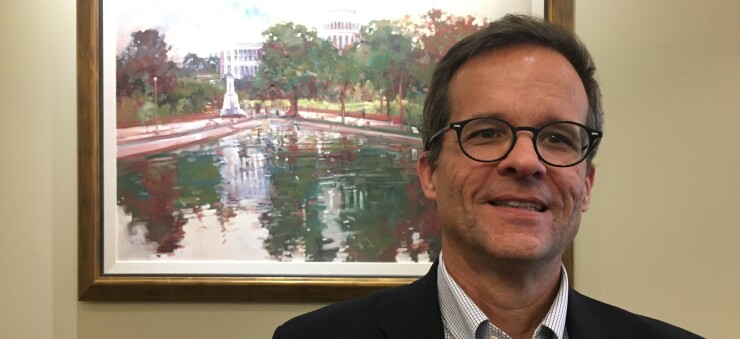Overcoming a major obstacle for Puerto Rico’s $35 billion central government debt deal, bond insurers Assured Guaranty and National Public Finance Guarantee reached a revenue bond deal Monday night.
The $4.6 billion revenue bond deal secured their continued support for the central debt deal.
“The agreement we reached over the weekend is yet another significant step towards a consensual plan of adjustment that can take Puerto Rico out of bankruptcy,” said board Chairman David Skeel. “Mediation under the leadership of Judge Barbara Houser continues to be successful in reaching agreements with as many creditors as possible to avoid time-consuming and costly litigation.”
Part of the central government plan of adjustment announced March 8 was the Plan Support Agreement for the island’s general obligation and Public Building Authority bonds, announced in February. The plan of adjustment required the continuation of the PSA and that required support of holders of 70% of the PSA debt. The two insurers held 15% of the debt and if they withdrew their support the plan of adjustment could have collapsed.
The current Oversight Board’s “organizing principal is to make deals,” Board Member Justin Peterson said. “This is a new trajectory,” Peterson said. “We’re no longer litigating to zero.”

The insurers originally had the option of withdrawing their support until April 1, a deadline that was subsequently pushed back several times as the insurers pressed the Puerto Rico Oversight Board for acceptable terms for the Highways and Transportation Authority, Convention Center District Authority, and other revenue bonds they insure.
The agreement the insurers came to in principle on the HTA and CCDA bonds and how to handle money the central government had clawed back from these authorities going forward solidified their support of the PSA.
Holders of HTA bonds would receive $1.245 billion in current interest, capital appreciation, and convertible capital appreciation bonds. Additionally, they would receive $389 million in cash.
The bonds would have an average interest of 5.0% and maturity up to 40 years.
For the HTA privatization is an alternative to the revenue bond restructuring. The board declined to be any more specific about this.
CCDA bondholders would receive $112 million in cash. These CCDA and HTA terms exclude additional cash bondholders may receive from a Contingent Value Instrument.
The HTA has about $4.17 billion of revenue bonds outstanding and the CCDA has about $410 million of revenue bonds outstanding.
Since the beginning of the central government’s bankruptcy in spring 2017, it has diverted revenues for the HTA, CCDA and other semi-autonomous authority bonds. In the agreement reached Monday, the insurers and the board agreed on a way of restoring some of this money.
If the island’s Sales and Use Tax revenues performs better than projected by the board’s May 2020 certified fiscal plan, some of that money might make it back to the holders of the HTA, CCDA, and other revenue bonds. According to the deal, in years one through 22 the first $100 million of the outperformance would go to holders of the GO bonds. The next $11.1 million would go to the creditors who lost to the “clawback.” After the $111.1 million the clawback creditors (revenue bond holders) would get 10% of the available payment.
The “clawback” creditors would get a greater share in years 23 to 30. This potential addition mechanism is called a Contingent Value Instrument.
All of these payments are subject to additional restrictions.
Advantage Business Consulting President Vicente Feliciano said the Contingent Value Instrument could become standard in future bond-restructuring processes.
Puerto Rico Clearinghouse Principal Cate Long said "The agreement in principle between Assured Guaranty, National Public Finance and the [Oversight Board] is another very positive step between two sides that have been extremely adversarial towards each other since 2016."
The Puerto Rico Oversight Management and Economic Stability Act “was intentionally structured to put consensual negotiations ahead of litigation but the prior [Oversight Board] and a few current members have repeatedly resorted to fighting in court instead of fighting over a negotiating table,” Long continued. “Puerto Rico has more than sufficient capacity to pay all their debts and pensions and by aggressively attacking bondholders the prior [board] defeated one of the principle requirements of PROMESA which is to regain market access at reasonable rates.”
"The new agreement with insurers has a 5% coupon and most of the newly issued debt (except PRASA) has very high coupons given the interest rate environment," Long said.
To go into effect the agreement announced Monday would have to be put into formal documents, voted on by the creditors, and approved by the United District Court for Puerto Rico.





